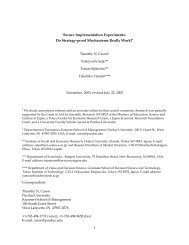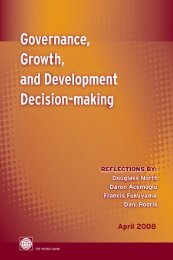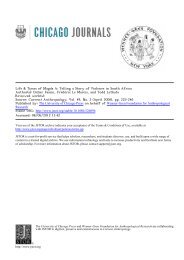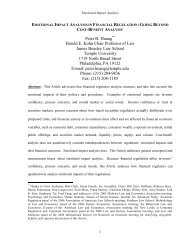Compassion and Repression: The Moral Economy of Immigration ...
Compassion and Repression: The Moral Economy of Immigration ...
Compassion and Repression: The Moral Economy of Immigration ...
You also want an ePaper? Increase the reach of your titles
YUMPU automatically turns print PDFs into web optimized ePapers that Google loves.
IMMIGRATION POLICIES IN FRANCE 381<br />
dimension <strong>of</strong> the menace has recently become perceptible. Although difficult to<br />
name, as it is masked by cultural or religious, sometimes ethnic, description, it can<br />
be characterized most bluntly as racial security: it has to do with the protection <strong>of</strong> a<br />
European, Christian, <strong>and</strong> white civilization against Third World, Muslim, or black<br />
populations, as the debates surrounding the entrance <strong>of</strong> Turkey to the European<br />
community <strong>and</strong> the contestation about Islamic veiling in public institutions in<br />
France have revealed. Within this context, which has evolved far from the humanist<br />
principles <strong>of</strong> the Geneva Convention, asylum seekers <strong>and</strong> aliens in general are seen<br />
as potential threats to these three dimensions <strong>of</strong> European security.<br />
On the other side <strong>of</strong> the biopolitics <strong>of</strong> asylum lies the camp as a territory<br />
<strong>of</strong> exception. Although Sangatte represents the most famous <strong>and</strong> symbolic image<br />
<strong>of</strong> this figure, it is only one <strong>of</strong> its numerous manifestations, <strong>and</strong> it is certainly<br />
not the worst. In the 122 “waiting zones” existing along France’s borders, where<br />
asylum seekers are retained until <strong>of</strong>ficial agents decide whether they will be allowed<br />
to present their file, human rights activists regularly criticize the indignity <strong>of</strong> the<br />
accommodations <strong>and</strong> the violence exerted by the police, the lack <strong>of</strong> communication<br />
with the outside, <strong>and</strong> the impossibility <strong>of</strong> receiving the legal assistance <strong>of</strong> lawyers,<br />
as well as the absence <strong>of</strong> any external control or judicial appeal. Of the detention<br />
centers where the undocumented foreigners, many <strong>of</strong> whom are rejected asylum<br />
seekers, wait to be deported, many reports, including some from the conservative<br />
senate, have denounced the inhumane conditions <strong>and</strong> the suspension <strong>of</strong> normal<br />
rights. <strong>The</strong> unique “double sentence” is applied to aliens accused <strong>of</strong> delinquent or<br />
criminal acts, which in most cases are simply acts <strong>of</strong> resistance to expulsion. <strong>The</strong>se<br />
individuals are condemned to be imprisoned <strong>and</strong> then driven out <strong>of</strong> the country<br />
on release, no matter how long they have lived in France, in some cases from<br />
the time they were children. In the first months <strong>of</strong> 2003, two immigrants died <strong>of</strong><br />
suffocation as they struggled against police <strong>of</strong>ficers attempting to secure them for<br />
detention. <strong>The</strong> aftermath <strong>of</strong> this case demonstrates how far one can go to get rid<br />
<strong>of</strong> the undesirable with apparent impunity <strong>and</strong> little public outcry. <strong>The</strong>se scenes<br />
delineate a map <strong>of</strong> territories within the European political geography where the<br />
exception comes to be tolerated (see Figure 5).<br />
Contrary to Agamben’s prophetic view that the camp, <strong>and</strong> not the polis, is<br />
the biopolitical paradigm <strong>of</strong> the West, I would rather say that these are the two<br />
sides <strong>of</strong> contemporary democracies. Because these regimes defend the polis for<br />
the happy few, they invent the camp for the undesirable. In the former, life is<br />
recognized as the political existence <strong>of</strong> the citizen, whereas in the latter, it is<br />
reduced to the bare life <strong>of</strong> the vagabond. Between the polis—however idealized<br />
it may be—<strong>and</strong> the camp—however marginal it may seem—the tensions are thus<br />
extreme. However, it would be cynical or simplistic to think that the collective<br />
renunciation manifested by the camp is the price we pay for the comfort <strong>of</strong> the<br />
polis. Indeed, these tensions between the two figures <strong>of</strong> our world explain why,<br />
with respect to asylum seekers <strong>and</strong> unwanted others in general, repression <strong>and</strong><br />
compassion are so pr<strong>of</strong>oundly linked. Not only is there no separation between
















